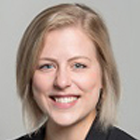Bridging a gap in care
By Jennifer Parraga, BA'93
 It’s Sunday evening in London, Ontario and dozens of people stream into The Salvation Army for the Community Meal. Held twice weekly, the Meal has served thousands of people each year.
It’s Sunday evening in London, Ontario and dozens of people stream into The Salvation Army for the Community Meal. Held twice weekly, the Meal has served thousands of people each year.
For the third time in the past few months, Dr. Hannah Ernst is there. Standing alongside otolaryngologist Dr. Danielle Macneil and Oral Maxillofacial Surgeon, Dr. Henry Lapointe, Dr. Ernst is conducting an oral cavity cancer (OCC) screening program.
With full support from The Salvation Army, Dr. Ernst says that the Program’s objectives include bridging a gap between tertiary care Otolaryngology- Head and Neck Surgery and the community by facilitating a positive health care experience; providing a screening examination and education regarding OCC risk factors in order to prevent or detect oral cavity malignancy; and attempting to address simple and modifiable oral health concerns with oral surgery assessment and referrals.
Dr. Ernst first heard of a similar program a few years ago that was established by a resident group affiliated with University of British Columbia and hosted in downtown Vancouver.
“I thought to myself, there is a need for that here,” said Dr. Ernst.
It wasn’t until the resident physician learned about a man, with an enlarging facial mass who would regularly stay at a local shelter and was afraid to seek care, that she began to think about how she could establish a local screening program in London.
“Sometimes being an advocate for people means getting out there, getting to know people, creating relationships and breaking down barriers. It’s complicated and longitudinal, but something simple like this can make a difference.”
By bringing care to people where they live, eat and socialize, Dr. Ernst hoped that she could create some positive relationships, create positive health care experiences while rebuilding trust and possibly detecting health issues, even before they start. She reached out to her colleagues and to the team at The Salvation Army and began to plan the Program.
For Dr. Ernst, volunteering with vulnerable populations is a regular part of life. She became involved locally when she was in high school, working with Ark Aid Mission. For eight years, she worked as a monthly night coordinator.
“It’s through this amazing organization that I had the opportunity to get a glimpse into the challenges that so many in our city face, but are simply not realized or publicized,” she said. “Years of seeing the same faces come to the Mission is not just a reflection of each person’s struggle but a system that is ill-equipped and over-capacity.”
Dr. Ernst says that the screening program is only possible thanks to the involvement of her colleagues and The Salvation Army. She is grateful to Drs. Macneil and Lapointe, whose enthusiasm, expertise and advocacy at the University departmental level ensured the initiative could move forward. She is also very appreciative of Dianna Sakellis and Sarah Collins from The Salvation Army who worked with the physician team to find a space, advertise, develop culturally sensitive questionnaires, signs and provide feedback as to how to be sensitive to their clients needs.
“We couldn’t do this without the support of The Salvation Army,” she said. “They are incredible and are eager for us to be involved; it’s been a pleasure working with them.”
To date they have been able to screen 58 people, and made 17 referrals for free dental care. Dr. Ernst believes through education and by creating a positive relationship with the community, they will be able to help should a cancerous lesion arise.
As an aspiring global surgeon, Dr. Ernst wants to be able to provide safe, affordable and accessible health and surgical care in her own community, and make a positive impact on the relationship that marginalized people in London have with health care.
“Sometimes being an advocate for people means getting out there, getting to know people, creating relationships and breaking down barriers. It’s complicated and longitudinal, but something simple like this can make a difference,” she said.








